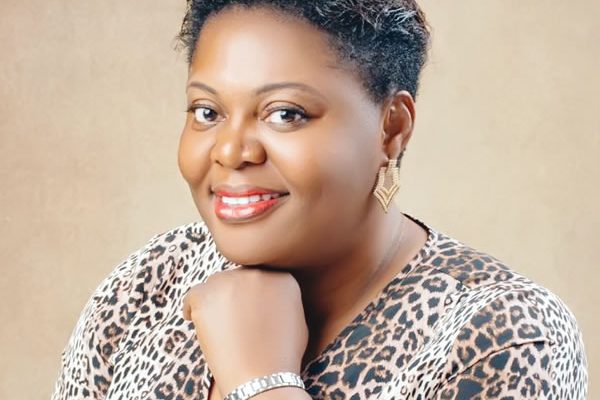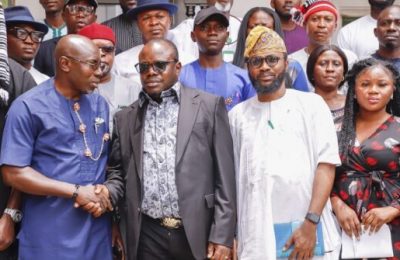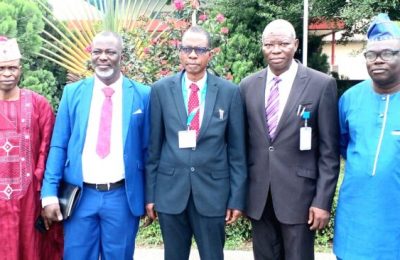Dr Temitope Farombi, a consultant neurologist at the Chief Tony Anineh Geriatric Centre, University College Hospital, Ibadan, says in this interview conducted by Sade Oguntola that many elderly people hallucinating or talking out of context as a result of a lack of coordination of their speech centre mistaken to be witches, wizards, or spiritual possessions are actually suffering from dementia.
Harmful traditional beliefs in witchcraft and spiritual possession are still prevalent in Africa and Nigeria, inclusive. Often, it is linked with dementia in older people. How and why is this so?
African people are largely people of faith; this faith depends on Christianity, Islam, and traditional beliefs. All these have a spiritual undertone to how people behave, and then the belief that anything that happens to anyone has a spiritual undertone. And then we have heightened it over even scientific knowledge. In the past, we were killing twins because they were tagged demons in this country. With knowledge now, we have twins in abundance. So, too, is the belief system around dementia.

Now, scientifically, women are likely to have dementia twice as much as men. This is because women live longer than men, and they accumulate a lot of stress over the years—bearing children, taking care of families, and everything. The effect of oestrogen, the hormone that protects us from even the stress that women go through, wears off when a woman reaches menopause. So after menopause, you start to see everything coming out, including hypertension, diabetes, as well as dementia.
So that’s why you see a lot of women coming down more with symptoms of dementia. But because of a lack of understanding of what dementia is in our community and a lack of knowledge of the symptoms of dementia in our community, we spiritualize it. That’s why I refer to the time when they were killing twins in Eastern Nigeria. It was because of a lack of understanding. And that is why the link between witchcraft, spirituality, and dementia is prominent in our communities.

An elderly woman who is hallucinating, confessing to having done certain bad things, having difficulty with spatial abilities, or maybe with impaired attention or behavioural change may be termed a witch in the community. How can this be explained?

That is the belief, and that’s so unfortunate. Let’s change the age group; if you found the same symptoms or expression of hallucination in a younger person, you would rather say the person is mad. You are less likely to call the person a witch.
Now, the media has helped to portray what a witch should look like in Nigeria and most African countries; they are often very old women, ragged and speaking incoherently. Often, someone under spiritual attack is portrayed as misbehaving, saying things out of context, and doing all that. This is what people are grown up to see.
As a result, when they see older women or older adults generally talking loquaciously, hallucinating, or talking out of context as a result of a lack of coordination of their speech centre, they presume it to be due to witchcraft or spiritual possession.
Now, different domains in the brain help us to be who we are and determine how we think, talk, react to the environment, and coordinate ourselves. When the coordination is not as it should be, we start having problems like hallucinations, difficulty with language, and an inability to retain memory. Then we also start becoming irritable.
Due to how the media portrays what witches look like, people just naturally transfer that assumption to older women who are having symptoms of dementia. Usually, witches, voodoo, or evil things are being taken care of by traditionalists and religious leaders. So oftentimes, they call them or they are taken to them. And of course, they too, because of the lack of understanding and awareness that this could be a medical condition, then take it up and do to them all kinds of things.
We’ve had situations whereby religious leaders will tell children not to go near their parents any longer because they are witches or wizards, or they are going to take their destiny away from them. So, you see these children that are supposed to be compassionate towards their parents start having wrong notions and pull away because the mother or the father is hallucinating.
In fact, some religious books say that we should not suffer a wish to live. So, in some cases, such parents are beaten up even in broad daylight; some are mobbed and killed.
In recent times, a woman was burned alive in Port Harcourt. There are other cases where older women were beaten by their own children because of their religious or cultural belief that they have evil spirits in them.
The belief is that evil spirit possession can cause personality changes, including making such an individual behave in unusual ways. But these are also symptoms that bear resemblance with what is seen in individuals with dementia. So, how can they be differentiated?
I’m going to take a cue from a statement in one of the religious books, which says that, allow the wheat and the weed to grow together, so that at the end of the day, we’ll be able to separate them. Since we have a belief system that is crossing symptoms of a medical issue, I would say, Let us take care of the medical aspect of it first. And then we can do the spiritual in the background. This is not to completely rule out spiritual importance to overall well-being and health, because that is the definition of health. It’s not just the absence of disease but also includes the spiritual, physical, and social well-being. I am not going to rule out the spiritual aspect of health; however, let us face the one that can be taken care of. Also, the religious book also says, Give unto Caesar what belongs to Caesar. When we say these things are crossing, let doctors take care of the medical aspects, and you can take care of the spiritual, but not to harm such an individual.
Are common symptoms like inability to speak, difficulty with language, problems with vision, and spatial abilities associated with ageing in every elderly? Will every older person experience all these due to ageing or dementia?
As we grow older, our reflexes reduce. For instance, some older people start talking more slowly because it takes a while for them to articulate what they want to say. This is as a result of weakness in the muscle around the mouth, or the latency of recall might be reduced. But it is not to the extent that they will completely forget what they want to say. Similarly, older people are not as brisk when walking as they used to do when they were much younger. They now have a shorter step. The slowing down is a part of a normal ageing process.
However, dementia is a disease of the brain, but it is not synonymous with aging. We’ve seen older people that are cognitively intact, even throughout their lives. Some in their 90s are taking PhD courses. So we cannot say because somebody in his or her old age has developed dementia; we then make it an umbrella statement for every other older person in the community.
But it is a fact that dementia is more common in those who are older. Also, the commonest symptom of dementia is progressive memory loss. The memory loss occurs bit by bit. It initially starts with the individual forgetting recent memory. For example, they may drop something and can’t find it. As such, they start turning things around. When they are told things, they can’t remember or retain them. So there’s an argument. They also tend to repeat words often and often because they lack the capacity to retain such memory at that point.
As time goes on, they won’t be able to recognise familiar faces. It can be as bad as being unable to recognise their spouses or children and even put a name to a face. And as time goes on, they start losing their coordination within the spaces they’ve gone to. Even within their own house, they can go to the kitchen instead of the toilet or go to another person’s room instead of their own. And when they then go out, occasionally they wander out of place.
Also, they have problems with language, what is called name-finding difficulties. They want to call, for example, a mosque, they will say, where we worship. They are unable to find that singular name that is common to a particular thing they are trying to describe. Then all these things make them anxious or depressed. So there’s a mood change that comes with a person living with dementia as a result of their failing memory. So it makes them anxious; they become easily irritable, and then because people don’t seem to understand them well, they end up snapping back. They say, Ah, when did you tell me this? When did I do this? So, those are the early signs and symptoms. But with the late signs, they can start withdrawing to themselves, becoming depressed. And then also, they can start hallucinating visually or auditory-wise. That is in the late stage. But it becomes bad that in the long run, they can’t do anything on their own any longer, and they become largely or 100% dependent on their families to take care of them.
Why are these symptoms mistaken for normal ageing or stress in the elderly?
Well, it is because of the lack of understanding and awareness of dementia. Because the condition is more common in the elderly, they assume that the person is just talking out of context because of ageing. Even when someone is losing memory, the general comment is “I am getting old.” That is not correct. That is why we really need to bring it to the public for them to know that losing memory, which can be quickly reversed, is normal in older adults. But when you cannot retain and reverse that loss of memory, and it becomes burdensome to you, you begin to turn the house around, and you start feeling uncomfortable even with your memory loss, that is dementia. That is the difference.
A lot of people believe that nothing can be done medically to help with memory loss and many of the symptoms that you highlighted. Is this true and why?
That’s not correct. Brain specialists and some other specialists in healthcare are trained to be able to manage these symptoms, including memory loss. But let me sound a note of warning. There is no cure for dementia at this moment, but it can be managed. It can be managed even socially by helping people to understand and then be able to treat individuals with the condition appropriately. There are also non-pharmacological ways of managing it. You rearrange the house, we tell them things in queues, and there are medications to slow down the progression of the disease. So, there is something we can do. We don’t have to lock them out of the help and assistance that they need.
How best can this common harmful belief, like a woman with impaired attention or hallucinations being a witch rather than dementia, be tackled?
First, we need our national orientation agencies to train and create awareness in the film industry and media not to misrepresent older adults as being witches. Also, we need to create awareness on what dementia really is among all ages in schools and security agencies. Often times, when these elderly are mobbed, they look away and do nothing. So, general awareness on dementia is important. Then, there should be policies from the government to protect the rights of these older adults that need to be enacted. I’m happy that there is a national ageing policy, and part of the national ageing policy includes the rights of older adults. However, it’s a broad policy that is not even disability- or dementia specific. Right now, we don’t have a national dementia policy. And I tell you, after stroke, dementia is the second most common cause of disability in older adults in Nigeria, even globally.
So, we need to have a policy for dementia so that we can train skilled people to be able to handle this condition. I saw recently a study that said that 66% of even medical practitioners in Africa still see dementia as normal aging. These are medical practitioners; they are not neurologists and psychiatrists; 66% is huge. So, if such a large number of health workers don’t understand the symptoms of dementia, how would they help? So, there is a need for training of medical practitioners and family carers to be able to take care of these elderly people. We may think that this is a thing of the future, but that is not the case because 10% of Nigeria’s population are individuals 60 years and older. That is over 20 million people who are 60 years and older in Nigeria who are at risk of dementia.
Religious and traditional leaders often exploit people’s belief in financial gains, especially people with signs and symptoms suggestive of dementia; how best can this be corrected?
I think there should be a law that can protect people who are suffering from dementia in such a way that makes the traditional or religious leader compulsorily refer anybody to the medical facility, even if it is just a suspicion of it. They are not supposed to retain that person. Compulsorily, such individuals should be referred to a medical practitioner for assessment before they continue the spiritual treatment as they claim to be doing.
For example, in the UK, there was a time when there was a high incidence of gender-based violence in marriages among black immigrants. They traced it to pastors preaching against divorce and asking that women stick it out even if the marriage is a threat to their lives or could lead to a loss of life. And so it encouraged gender-based violence in marriages among black immigrants. The way the government ensures to stop it was that if the pastor hears about it, the pastor is required by law to report to the officials. If it leads to a threat to life or loss of life, the pastor is liable for even hearing about it and not doing anything. So, we can actually apply a similar thing to protect the people living with dementia so that these people, in quotes, presumed to have spiritual problems are referred to the medical facility. It’s better to look at it even from a medical point of view. That way, we will be protecting the rights of people living with dementia.
What is it like living with dementia in Nigeria?
It is a double-whammy situation. One, there is no social support system for families who are taking care of people living with dementia. There is no social support system, even for the elderly. Dementia is even the number one cause of carer’s burden globally and the same also in Nigeria because, first, there is no social support system. There is no policy in place, no cushion system, or welfare system for older adults generally who are actually in the informal sector.
Perhaps people in the formal sector have their pension being given, but those in the informal sector get their pension from their family, their children, and their loved ones. And then, an economic issue happens and so the little they are given, they can no longer give anymore. So, we now find a lot of older adults being neglected and left alone. We have a lot of lonely older people now. People don’t want their parents to come live with them any longer because of the economic issue. And we know that loneliness and depression are risk factors for dementia. This is getting worse, even in Nigeria. So, the life of the person living with dementia and the family of the person living with dementia is a tough order. It’s not a palatable condition.
How do you mean that loneliness and depression are risk factors for dementia?
Yes, loneliness and depression are risk factors for dementia, and it is getting worse because people are leaving their parents behind. Other risk factors for dementia are, of course, ageing. There’s nothing anybody can do about it; gender, being a female increases the risk of dementia, and not taking care of one’s health in terms of hypertension, diabetes, and high cholesterol.
Similarly, lack of exercise, air pollution, smoking, sedentary lifestyle, excessive alcohol intake, malnutrition, and undernutrition are risk factors for dementia. So, climate has its importance in brain health and dementia. The good thing about it is that once we’re able to take care of the modifiable risk factors like hypertension, malnutrition, and the like, we can reduce the risk of dementia by 40%.
In sub-Saharan Africa, we all believe that our parents shouldn’t be made to stay in old age homes, even despite this reducing the likelihood of loneliness and depression. So, what will be your take regarding old people’s homes for the elderly?
Rather, my take is that we should create a social network that we used to have in the past. You know, there’s under the tree, where older people come to interact, listen to stories, and play all kinds of games even after coming back from their farm or business of the day. That has been eroded even from our society these days. But we can bring that back in a more structured way by creating daycare centres for older adults in the communities where they can go and just interact with themselves. And then putting different games in such a place.
For those who don’t want to go to homes or hospice centres, they can go or walk to the place, interact, make new friends, and talk. Community engagement can be done by involving older adults in voluntary things in the community. For those who are still active or who can still do one or two things, get them to do a few hours of maybe community support and remunerate them for it; this will encourage them. This, we can do by saying that any older adult that does maybe one or pick one or two things, clears the bin in the road in the street, and they get marked for it, can get their medication for free. So the government should be creative around this to engage older adults and then compensate accordingly can even use medication or meal vouchers for older adults. In this case, you can even use medication or meal vouchers for older adults. So, it makes them to want to do it.
Does it mean that you are not in support of old people’s homes?
We are not ripe for the old people’s home. Even in places where they are doing it, the old people still want it to be a communal living so that it wouldn’t be like another prison, where children will just drop their parents there and forget about them. That looks to them like a prison, so we cannot take what is done outside hook line and sinker because they too are trying to see how they can make it as homely as possible, such that it won’t be tagged as people’s homes. So, that is why we can start with creating community centres where older people can come. And then they can interact.
And if you know that you are not going to be home, your parents can come around. Somebody can follow you to the place, or they can even create mobile vehicles to come and pick them around and then do recreation and take them back to their respective homes. That will be a major treatment for loneliness that we are seeing in older adults now.
Is there any ongoing study or intervention to help Nigerians understand dementia better?
But right now, we need to know the level of dementia in our community; we don’t have data on that. And then, we need to also identify barriers to knowledge and awareness and see how we can actually improve access to healthcare for people with dementia. For that reason, we have an ongoing project. It’s called the African Dementia Consortium Project. This is across nine African countries because Africa is being seen as a destination for future dementia, as the incidence and prevalence of dementia are fast increasing. So, we are seeing Africa as a dementia destination.
So, part of the things that we are doing is that we are involving the community people. We set up what we call the Community Advisory Board for dementia. These are people, religious leaders, and the media. These are people involved in the lives of older persons in the community, so they know them better. They’ll be able to identify the barriers and identify issues about awareness and knowledge and the harmful practices that we see in the community.
And they will be able to come up with ideas and then give us a guide and help us with the community entry for people to know that this mama that is suffering is not a witch; it is a result of dementia. They will be able to relate better with somebody they know in the community than a stranger coming to meet them and tell them things. So, that is what we are doing in the African Dementia Consortium. And then we’ve been able to have a Community Advisory Board member for dementia across all nine African countries.
I tell you, a lot of people are coming forward now. A lot of people are bringing their loved ones. They didn’t know before, but now they do. We are having an increasing inflow of people with dementia coming to the clinic. So, it’s very good, but it’s still an ongoing study. We’ve not published what we’ve found yet. It’s a five-year study, but definitely, we’ll let people know as we move on.
ALSO READ: Japa: Trump promises US green card to foreign graduates








